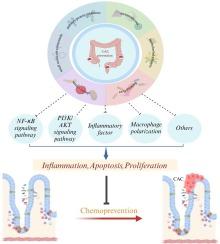Research progress on anti-inflammatory drugs for preventing colitis-associated colorectal cancer
IF 4.8
2区 医学
Q2 IMMUNOLOGY
引用次数: 0
Abstract
Colorectal cancer (CRC) is the third most prevalent malignancy worldwide. Inflammatory bowel diseases (IBD) encompass a group of chronic intestinal inflammatory disorders, including ulcerative colitis (UC) and Crohn’s disease (CD). As a chronic inflammatory bowel disease, UC may persist and elevate the risk of malignancy, thereby contributing to the development of colorectal cancer, known as colitis-associated colorectal cancer (CAC). Chronic intestinal inflammation is a significant risk factor for colorectal cancer, and the incidence of colitis-associated colorectal cancer continues to rise. Current studies indicate that therapeutic agents targeting inflammation and key molecules or signaling pathways involved in the inflammatory process may effectively prevent and treat CAC. Mechanistically, drugs with anti-inflammatory or modulatory effects on inflammation-related pathways may exert preventive or therapeutic roles in CAC through multiple molecules or signaling pathways implicated in tumor development. Moreover, the development or discovery of novel drugs with anti-inflammatory properties to prevent or delay CAC progression is becoming an emerging field in fighting against CRC. Therefore, this review aims to summarize drugs that prevent or delay CAC through modulating anti-inflammatory pathways. First, we categorize the published studies exploring the role of anti-inflammatory in CAC prevention. Second, we highlight the specific molecular mechanisms underlying the anti-inflammatory effect of the above-mentioned drugs. Finally, we discuss the potential and challenges associated with clinical application of these drugs. It is hoped that this review offers new insights for further drug development and mechanism exploration.

预防结肠炎相关大肠癌的消炎药研究进展。
结直肠癌(CRC)是全球发病率第三高的恶性肿瘤。炎症性肠病(IBD)是一组慢性肠道炎症性疾病,包括溃疡性结肠炎(UC)和克罗恩病(CD)。作为一种慢性炎症性肠病,溃疡性结肠炎可能会持续存在并增加恶性肿瘤的风险,从而导致结直肠癌的发生,即结肠炎相关性结直肠癌(CAC)。慢性肠道炎症是结直肠癌的重要风险因素,结肠炎相关性结直肠癌的发病率持续上升。目前的研究表明,针对炎症和参与炎症过程的关键分子或信号通路的治疗药物可有效预防和治疗 CAC。从机理上讲,对炎症相关通路具有抗炎或调节作用的药物可通过与肿瘤发生有关的多种分子或信号通路对 CAC 发挥预防或治疗作用。此外,开发或发现具有抗炎特性的新型药物以预防或延缓 CAC 的进展正成为抗击 CRC 的一个新兴领域。因此,本综述旨在总结通过调节抗炎通路来预防或延缓 CAC 的药物。首先,我们对已发表的探讨抗炎药在 CAC 预防中作用的研究进行了分类。其次,我们强调了上述药物抗炎作用的具体分子机制。最后,我们讨论了与这些药物的临床应用相关的潜力和挑战。希望本综述能为进一步的药物开发和机制探索提供新的见解。
本文章由计算机程序翻译,如有差异,请以英文原文为准。
求助全文
约1分钟内获得全文
求助全文
来源期刊
CiteScore
8.40
自引率
3.60%
发文量
935
审稿时长
53 days
期刊介绍:
International Immunopharmacology is the primary vehicle for the publication of original research papers pertinent to the overlapping areas of immunology, pharmacology, cytokine biology, immunotherapy, immunopathology and immunotoxicology. Review articles that encompass these subjects are also welcome.
The subject material appropriate for submission includes:
• Clinical studies employing immunotherapy of any type including the use of: bacterial and chemical agents; thymic hormones, interferon, lymphokines, etc., in transplantation and diseases such as cancer, immunodeficiency, chronic infection and allergic, inflammatory or autoimmune disorders.
• Studies on the mechanisms of action of these agents for specific parameters of immune competence as well as the overall clinical state.
• Pre-clinical animal studies and in vitro studies on mechanisms of action with immunopotentiators, immunomodulators, immunoadjuvants and other pharmacological agents active on cells participating in immune or allergic responses.
• Pharmacological compounds, microbial products and toxicological agents that affect the lymphoid system, and their mechanisms of action.
• Agents that activate genes or modify transcription and translation within the immune response.
• Substances activated, generated, or released through immunologic or related pathways that are pharmacologically active.
• Production, function and regulation of cytokines and their receptors.
• Classical pharmacological studies on the effects of chemokines and bioactive factors released during immunological reactions.

 求助内容:
求助内容: 应助结果提醒方式:
应助结果提醒方式:


